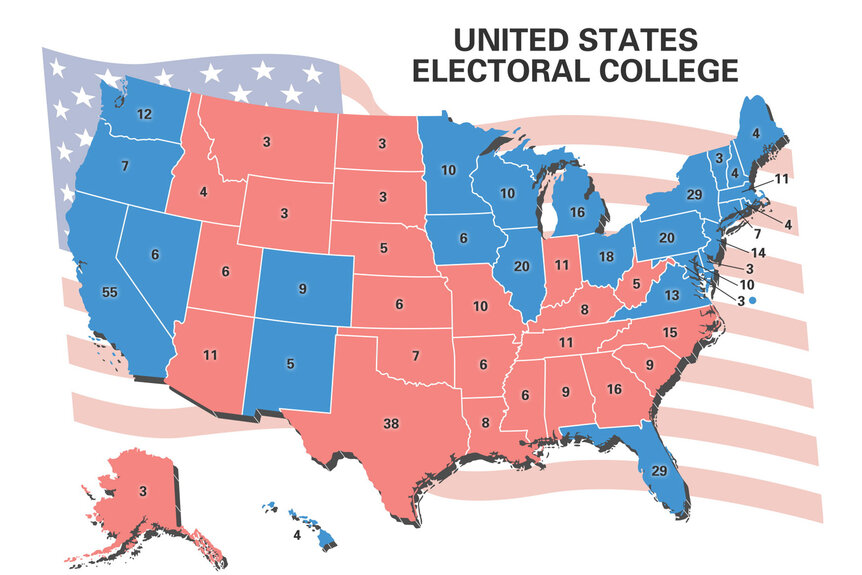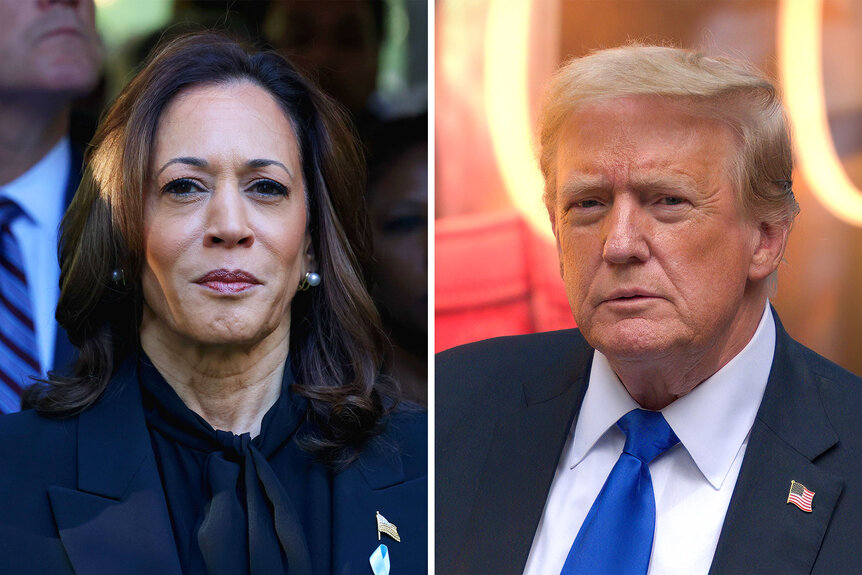How Many Electoral Votes Does Each State Have in 2024? The Process, Explained
NBC will be on top of this election's Electoral College results until a winner is announced.
Every four years, Americans head to the polls to vote for the nation’s next president. But the voting process doesn’t end at the ballot box. A required number of electoral votes will actually determine the winner between Vice President Kamala Harris and former President Donald Trump.
The Electoral College, a designated group of electors responsible for casting their state’s vote for president, decides who will be elected. This process has been enshrined in the Constitution since 1787, though the system has a controversial history and recent surveys show most Americans want to do away with it altogether.
RELATED: Jimmy Fallon's Joe Biden Gets Election Advice from Barack Obama: Watch
So what are electoral votes exactly and how does the process work? Here’s what you need to know as you keep up with the latest on the 2024 presidential election.
What are electoral votes?
Simply put, electoral votes will determine the outcome of the presidential election between Harris and Trump. There are a total of 538 electoral votes and a candidate must obtain at least 270 to be elected.
Each state has one electoral vote for each senator and representative it has in its congressional delegation. For example, because New York has two senators and 26 representatives, the state has a total of 28 electoral votes for the general election in 2024.
How many electoral votes does each state have?
The number of electoral votes each state has is determined by the state’s population. For the 2024 presidential election, this number is based on the 2020 census data, according to The National Archives and Records Administration.
For example, California, which has nearly 39 million residents, has the most electoral votes at 54, while Wyoming’s population size of roughly 577,000 people allots the state three electoral votes.
Below is the full list of how many electoral votes each state gets for the 2024 presidential election:
- Alabama: 9 votes
- Alaska: 3 votes
- Arizona: 11 votes
- Arkansas: 6 votes
- California: 54 votes
- Colorado: 10 votes
- Connecticut: 7 votes
- Delaware: 3 votes
- District of Columbia: 3 votes
- Florida: 30 votes
- Georgia: 16 votes
- Hawaii: 4 votes
- Idaho: 4 votes
- Illinois: 19 votes
- Indiana: 11 votes
- Iowa: 6 votes
- Kansas: 6 votes
- Kentucky: 8 votes
- Louisiana: 8 votes
- Maine: 4 votes
- Maryland: 10 votes
- Massachusetts: 11 votes
- Michigan: 15 votes
- Minnesota: 10 votes
- Mississippi: 6 votes
- Missouri: 10 votes
- Montana: 4 votes
- Nebraska: 5 votes
- Nevada: 6 votes
- New Hampshire: 4 votes
- New Jersey: 14 votes
- New Mexico: 5 votes
- New York: 28
- North Carolina: 16
- North Dakota: 3 votes
- Ohio: 17 votes
- Oklahoma: 7 votes
- Oregon: 8 votes
- Pennsylvania: 19 votes
- Rhode Island: 4 votes
- South Carolina: 9 votes
- South Dakota: 3 votes
- Tennessee: 11 votes
- Texas: 40 votes
- Utah: 6 votes
- Vermont: 3 votes
- Virginia: 13 votes
- Washington: 12 votes
- West Virginia: 4 votes
- Wisconsin: 10 votes
- Wyoming: 3 votes
How does my vote affect electoral votes?
When you head to the polls, you're actually not directly voting for Harris or Trump. Rather, your vote determines the slate of electors that will be casting your states' votes for president. Each political party chooses their own collection of potential electors, so when you're voting for a candidate, you're really voting for a batch of electors that candidate's party has selected.
Most states follow a “winner-take-all policy” and electors vote for the winner of their state’s popular vote. However, two states – Maine and Nebraska – allocate their electors proportionally. Each of those states award two electoral votes to the overall winner of the state's popular vote, but then also give one electoral vote to the winner of each individual congressional district (two for Maine, three for Nebraska). Thus, it's possible in both of these states for each candidate to win at least one electoral vote.
It is also possible, though extremely rare, that an elector could go against their state’s popular vote. As the General Services Administration explains, “While the Constitution does not require electors to vote for the candidate chosen by their state's popular vote, some states do. The rare elector who votes for someone else may be fined, disqualified, and replaced by a substitute elector. Or they may even be prosecuted by their state.”
RELATED: Kamala Harris Just Reviewed Maya Rudolph's SNL Impression from Season 50
How to watch election night coverage on NBC
There are many options to catch NBC’s election coverage on November 5. You can watch it directly on TV by tuning into your local NBC affiliate channel. With a cable login, you can stream NBC’s coverage online with DirecTV Stream, fuboTV, or Hulu + Live TV. NBC's 24/7 YouTube channel will also be live streaming news coverage on election night.
NBC’s streaming platform Peacock will also have a special Election Hub available on November 5. With Peacock’s Multiview experience, users can switch back and forth between real-time election coverage from NBC News Now, Electoral College results from the NBC News Decision Desk, and get the latest on polling numbers from Steve Kornacki on the live “Kornacki Cam.”






















